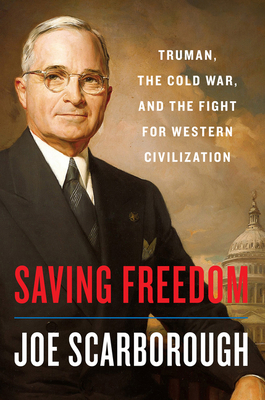Saving Freedom: Truman, the Cold War, and the Fight for Western Civilization

Saving Freedom: Truman, the Cold War, and the Fight for Western Civilization
The host of MSNBC's Morning Joe reveals how President Harry Truman defended democracy against the Soviet threat at the dawn of the Cold War.
Harry Truman had been vice president for less than three months when President Franklin Roosevelt died. Suddenly inaugurated the leader of the free world, the plainspoken Truman candidly told reporters he, felt like the moon, the stars, and all the planets had fallen on me. He faced a hostile world stage. Even as World War II drew to a close, the Cold War was around the corner. The Soviet Union went from America's uneasy ally to its number one adversary. Through shrewd diplomacy and military might, Joseph Stalin gained control of Eastern Europe, and soon cast an acquisitive eye toward the Balkans--and beyond. Newly liberated from fascism, Europe's future was again at risk, its freedom on the line. Alarmed by the Soviets' designs, Truman acted. In a speech before a joint session of Congress on March 12, 1947, he announced a policy of containment that became known as the Truman Doctrine--a pledge that the United States would support free peoples who are resisting attempted subjugation by armed minorities or by outside pressures. In Saving Freedom, Joe Scarborough moves between events in Washington and those in Europe--in Greece, where the U.S.-backed government was fighting a civil war with insurgent Communists, and in Turkey, where the Soviets pressed for control of the Dardanelles--to analyze and understand the changing geopolitics that led Truman to deliver his momentous speech. The story of the passage of the Truman doctrine is an inspiring tale of American leadership, can-doism, bipartisan unity, and courage in the face of an antidemocratic threat. Saving Freedom highlights a pivotal moment of the Twentieth Century, a turning point where patriotic Americans worked together to defeat tyranny.
History called on Harry Truman to unite the Western world against Soviet communism, but first he had to rally Republicans and Democrats behind America's most dramatic foreign policy shift since George Washington delivered his farewell address. How did one of the least prepared presidents to walk into the Oval Office become one of its most successful?The year was 1947. The Soviet Union had moved from being America's uneasy ally in the Second World War to its most feared enemy. With Joseph Stalin's ambitions pushing westward, Turkey was pressured from the east while communist revolutionaries overran Greece. The Bri
PRP: 220.93 Lei
Acesta este Prețul Recomandat de Producător. Prețul de vânzare al produsului este afișat mai jos.
198.84Lei
198.84Lei
220.93 LeiLivrare in 2-4 saptamani
Descrierea produsului
The host of MSNBC's Morning Joe reveals how President Harry Truman defended democracy against the Soviet threat at the dawn of the Cold War.
Harry Truman had been vice president for less than three months when President Franklin Roosevelt died. Suddenly inaugurated the leader of the free world, the plainspoken Truman candidly told reporters he, felt like the moon, the stars, and all the planets had fallen on me. He faced a hostile world stage. Even as World War II drew to a close, the Cold War was around the corner. The Soviet Union went from America's uneasy ally to its number one adversary. Through shrewd diplomacy and military might, Joseph Stalin gained control of Eastern Europe, and soon cast an acquisitive eye toward the Balkans--and beyond. Newly liberated from fascism, Europe's future was again at risk, its freedom on the line. Alarmed by the Soviets' designs, Truman acted. In a speech before a joint session of Congress on March 12, 1947, he announced a policy of containment that became known as the Truman Doctrine--a pledge that the United States would support free peoples who are resisting attempted subjugation by armed minorities or by outside pressures. In Saving Freedom, Joe Scarborough moves between events in Washington and those in Europe--in Greece, where the U.S.-backed government was fighting a civil war with insurgent Communists, and in Turkey, where the Soviets pressed for control of the Dardanelles--to analyze and understand the changing geopolitics that led Truman to deliver his momentous speech. The story of the passage of the Truman doctrine is an inspiring tale of American leadership, can-doism, bipartisan unity, and courage in the face of an antidemocratic threat. Saving Freedom highlights a pivotal moment of the Twentieth Century, a turning point where patriotic Americans worked together to defeat tyranny.
History called on Harry Truman to unite the Western world against Soviet communism, but first he had to rally Republicans and Democrats behind America's most dramatic foreign policy shift since George Washington delivered his farewell address. How did one of the least prepared presidents to walk into the Oval Office become one of its most successful?The year was 1947. The Soviet Union had moved from being America's uneasy ally in the Second World War to its most feared enemy. With Joseph Stalin's ambitions pushing westward, Turkey was pressured from the east while communist revolutionaries overran Greece. The Bri
Detaliile produsului











